

#INTHEAIREVERYWHERE
| |
 |
 #INTHEAIREVERYWHERE |
| Vol. 22 No. 43 | Monday December 4, 2023 |
| |
Grass Greener At FIATA |
Once upon a time a driving force of the meteorologist on Radio and TV was an answer to folks, in some cases desperately seeking enlightenment to an age-old question, the weather. Despite all the changes and advancements of world society, the fact remains that in 2023 everybody is talking climate, but we need to action it more. Enter the age of sustainability being the up front, most discussed topic on the agenda of every trade show. Right now in Dubai, where Boeing we hear has just sold 100 B787 airplanes to Emirates, the 2023 United Nations Climate Change Conference or Conference of the Parties of the UNFCCC, more commonly referred to as COP28 is taking place to world attention (we hope) . We can only assume that this overlong title for a gathering is driven in no small part because this is the 28th United Nations Climate Change Conference. Our hats off to the UN effort with both the length of the gathering that launched November 30 and runs until December 12, 2023 at Expo City, Dubai, and the level and number of participants from the world at COP28. This COP28 conference has been held annually since the first UN climate agreement in 1992. The COP28 conferences are intended for governments to agree on policies to limit global temperature rises and adapt to impacts associated with climate change. So what has COP28 done since meetings began 31 years ago? Well for one thing, the environment in one form or another is on everyone’s mind as we meet. Here Marco Sorgetti looks at an outstanding gathering that was held recently just last October in Brussels where FIATA conducted its 2023 World Congress. Included in the sessions was a panel discussion titled, “Exploring The Future of Green Logistics.” We are sending this out at Christmastide to you and also to the UN organizers in Dubai as a voice to be considered from our logistics industry sharing the concerns and hopes of all of us. The question to all the official speakers and delegates and deep thinkers on the subject of sustainability and climate change, including Francesco La Camera, (above) Director-General of the International Renewable Energy Agency, who was interviewed in Dubai this week during the COP28 U.N. Climate Summit is, “What should we expect of this gathering and ourselves as we move the marble into 2024?
This is the third article I am writing about the FIATA World Congress 2023 in Brussels and I think I am still managing to convey new impressions, without duplications: quite an achievement for FIATA and the organisers I suppose. Throughout the congress there was much debate about environmental issues and green solutions, and not only at the sessions that were thus conceived. The protection of the environment, emissions, climate change, etc. were an integral part of the delegates’ sessions and filtered through the networking breaks, too. In order to remain in the area, let me start from the Multimodal Transport Institute’s session held on October 1st. It was not the first one in the morning and, admittedly, being a delegates’ session, my chronicle may sound in parts like a report. I am sure tough that the announcements and statements captured were significant, in particular if you read some of them with hindsight. What happened six days later in Israel, and the consequences we are seeing every day on our screens are a sad story indeed. What kind of impact this will have on our future work remains to be seen, but it is interesting to hear what they were saying on trade lanes and corridors then, from some points of view unwittingly anticipating the events? The MTI is one of the historical FIATA institutes, dealing with maritime, road and rail transport. Those forwarders that look at this work with scarce attention should realise how much of their individual success depends on the work provided by the selfless, accomplished professionals, who carry the load forward for the entire segment by contributing to FIATA’s work. 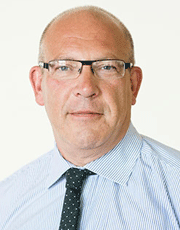 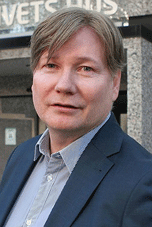 The
meeting was opened by the chairman Mark Bromley, (left) from the
UK, who welcomed the audience in an almost packed meeting space. VP Ole
Hagen, (right) chair of the WG Rail, then gave his report informing
the delegates that the FIATA Working Group Rail had participated in a session
in South America together with UIC,
which has a MoU with FIATA. The next session, casting a glance on to the
Europe-Asia land bridge, will be held in Istanbul on Nov 20th and 21st.
Now that we are sitting amid an unprecedented crisis in the Middle East,
which was surely not anticipated on October 1st, the fate of the Euro-Asian
land bridge, as well as other continental corridors’, remains to be
seen: everyone hopes for a swift, peaceful solution, but let us keep in
mind that the scenario FIATA delegates were contemplating then might appear
different to our eyes now. The
meeting was opened by the chairman Mark Bromley, (left) from the
UK, who welcomed the audience in an almost packed meeting space. VP Ole
Hagen, (right) chair of the WG Rail, then gave his report informing
the delegates that the FIATA Working Group Rail had participated in a session
in South America together with UIC,
which has a MoU with FIATA. The next session, casting a glance on to the
Europe-Asia land bridge, will be held in Istanbul on Nov 20th and 21st.
Now that we are sitting amid an unprecedented crisis in the Middle East,
which was surely not anticipated on October 1st, the fate of the Euro-Asian
land bridge, as well as other continental corridors’, remains to be
seen: everyone hopes for a swift, peaceful solution, but let us keep in
mind that the scenario FIATA delegates were contemplating then might appear
different to our eyes now. The Working Group Road update was given by the MTI Chairman himself. Mark Bromley reported on various meetings at the UN Expert Level Group, e.g. validation issues with eCMR. On this particular point working with IRU showed agreement with FIATA on much of the issues, but “more work is required” was the end remark. New road transport corridors will be fully explored up to China, whilst issues in transiting Russia remain, as traffic cannot be shifted instantly without consequences. Issues with drivers’ shortages surfaced again in Mark’s report, and it was observed that TNT solved the problem by simply increasing the salaries . . . Were delegates from Africa talking of young qualified drivers in Africa that could not find jobs, questioned the Chair, but a delegate from Kenya replied on behalf of the East African countries that some of these had gone to work in the Middle East. FIATA is planning a face-to-face WG Road meeting in November in Istanbul, where these and other issues will be dealt with in greater detail. The Working Group Sea took the baton next, with SVP Jens Roemer reporting: “Industry stood strong in finding solutions during the pandemic.” But it was noted that things had changed rapidly this year: now there is massive overcapacity, which leads to collapsing rates: hence it is more difficult to distinguish your own product through value added services. Probably, the soon-to-be end of 2M alliance will imply changes for the sector. Reportedly, the WG Sea has done a lot to create awareness and fight unfairness in shipping lines’ practices, as we see below. Climate change issues are gaining more and more momentum and need to be addressed: “We must understand the different fuel options and opportunities, on both sides; bunker/oil is the mother of all surcharges”. On another tone GHG emissions reports are required by customers now, and this gives food for thought in all areas of the industry. As some noted, too little time has been devoted to inland waterways in the past, but statements made at the meeting would ensure something more on this will come in future, thus expanding the concept of maritime to waterborne transport. 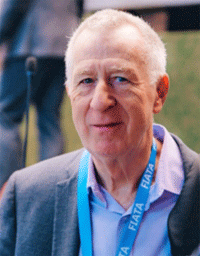 With
regard to rumours stating that there is a threat to the freight forwarder
waged by high tech companies, SG Bob Keen said it was “a load of rubbish”
. . . The idea of freight forwarders being able to adapt
is always on the menu: it has happened in the past and it will happen again.
In the attempt to inform members of relevant legal developments affecting
their future work, references were made by the chair to ICS
II rel.3, maritime single window and sustainability promoting transparency.
Regarding the EU block exemption for consortia, the WG Sea provided members
with updates on the successful – we know now – work
done by CLECAT. With
regard to rumours stating that there is a threat to the freight forwarder
waged by high tech companies, SG Bob Keen said it was “a load of rubbish”
. . . The idea of freight forwarders being able to adapt
is always on the menu: it has happened in the past and it will happen again.
In the attempt to inform members of relevant legal developments affecting
their future work, references were made by the chair to ICS
II rel.3, maritime single window and sustainability promoting transparency.
Regarding the EU block exemption for consortia, the WG Sea provided members
with updates on the successful – we know now – work
done by CLECAT. With regard to digitisation it was observed that “we should remain owners of our data”. The Cargo Integrity Group represents all segments in the maritime supply chain and the TT Club helped driving the group into the right direction. In FIATA’s advocacy work with regulators in surveying competition law internationally, FIATA must be perceived as a professional association, as was noted by the chair. The MTI participated in UNCTAD related work, whilst the lobbying action on demurrage and detention is on-going, considering much of the evidence still remains anecdotal. The Chair exhorted: “Please follow the developments at national level and use our best practice document. Active forwarders, we are doing all this for you! You need to take your future in your own hands.” Good news came then to FIATA from the International Maritime Organisation (IMO), with a focus on working towards a transparent and sustainable supply chain. Milk and honey for all FIATA delegates, who followed the developments with the IMO for years, Ms. Tang from the Geneva Secretariat announced that FIATA had recently gained observer status at the IMO. The Council of the IMO recognised that FIATA could help IMO’s work in particular on issues of digitisation and single windows. Hence it had invited FIATA to participate in the imminent session on data harmonisation. Jens Roemer underlined the success of this initiative, as a result of many years’ hard work. Bob Keen of Great Britain was appointed to represent FIATA at the IMO. 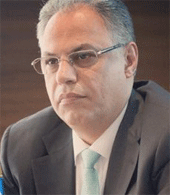 Regarding
delegates’ roundtable on key developments in their region, Farid Saffarzadeh
(right) of Iran observed that North South corridors were not effective
until the war in Ukraine started, now they are actually working and serve
many areas in that part of the world: several containers are being delivered
by multimodal transport to many CIS countries. Mr. Rosek of the Czech Republic
evoked issues with the lack of drivers and mega-trailers in Europe, i.e.
explored ways to increase volumes without increasing the number of drivers. Regarding
delegates’ roundtable on key developments in their region, Farid Saffarzadeh
(right) of Iran observed that North South corridors were not effective
until the war in Ukraine started, now they are actually working and serve
many areas in that part of the world: several containers are being delivered
by multimodal transport to many CIS countries. Mr. Rosek of the Czech Republic
evoked issues with the lack of drivers and mega-trailers in Europe, i.e.
explored ways to increase volumes without increasing the number of drivers.
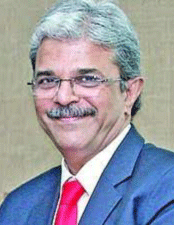 Samir
Shah (left) from India mentioned the Indian presidency of the G20,
and the new trade lane opened through the Eastern bloc: India - Middle East
- Eastern Europe, thus bypassing the Suez Canal. Questions remain open on
the transit time of this new trade corridor, but ostensibly there had been
progress after war erupted in Ukraine. This particular trajectory has the
objective of 30-32 days’ transit time, but some scepticism Samir
Shah (left) from India mentioned the Indian presidency of the G20,
and the new trade lane opened through the Eastern bloc: India - Middle East
- Eastern Europe, thus bypassing the Suez Canal. Questions remain open on
the transit time of this new trade corridor, but ostensibly there had been
progress after war erupted in Ukraine. This particular trajectory has the
objective of 30-32 days’ transit time, but some scepticism 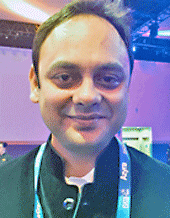 remained
regarding the many bottlenecks en route . . . Tej Contractor
(right) from India observed that the mentioned transport corridor
is actually a trade corridor, not just a freight corridor, and observed
that “we look at solar power to sustain it” and concluded that
the U.S. is supporting it. Samir Shah added that there could be a direct
underground link between Mumbai and Dubai in future. remained
regarding the many bottlenecks en route . . . Tej Contractor
(right) from India observed that the mentioned transport corridor
is actually a trade corridor, not just a freight corridor, and observed
that “we look at solar power to sustain it” and concluded that
the U.S. is supporting it. Samir Shah added that there could be a direct
underground link between Mumbai and Dubai in future. 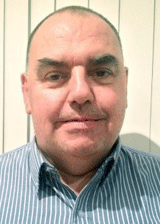 Paul
Golland (left) from Australia observed that a fine is levied on
containers in and out of Australia where a variance in weight is discovered.
Jens Roemer replied that only governments can fine traders, not terminal
operators: as recipients, they cannot implement the SOLAS
in this manner, but they have the right to protect their people and equipment
nonetheless. Paul
Golland (left) from Australia observed that a fine is levied on
containers in and out of Australia where a variance in weight is discovered.
Jens Roemer replied that only governments can fine traders, not terminal
operators: as recipients, they cannot implement the SOLAS
in this manner, but they have the right to protect their people and equipment
nonetheless. On Africa, notably several issues regarding unfair competition in maritime affairs were reported by delegates from Kenya: “WG Sea would have a field day in Kenya.” The LAMPSSET corridor is not ready yet, was lamented. Interventions from Chile and Argentina (the latter lamenting special authorisation for international payments creating delays), followed by Singapore (ASEAN accelerating region sustainability and digitisation, Inland, Maritime and road/rail corridors) concluded the agenda. All in all, this was one of the most interesting sessions open to FIATA delegates. At least this was my impression, in particular for the relevance and importance of the news that was shared with the audience. The many suggestions and observations pertaining to the environmental subjects found the perfect setting in the debate that was entertained on Thursday, October 5th 2023 with a clearly explicative title: “Exploring the Future of Green Logistics”. The line-up of speakers was quite impressive and could not be more resolutely conducive to the idea that logistics must do its own part in the transition to greener solutions.
In FIATA’s own words: “This panel brings together logistics stakeholders, from multinational giants to smaller freight forwarding companies for an engaging discussion on the pivotal role of sustainability in logistics. They address the regulatory landscape and industry standards across regions as well as the available tools to make a change”. It was indeed a very dynamic and lively debate: one of the most notable takeaways in my view: dispelling the faux concept that only big multinationals invest in green logistics. The role of smaller and medium forwarders was explained, appreciated and accepted. Minutes after the previous session FIATA delegates were introduced to another engaging topic for debate: “Navigating Evolving Transport Needs”, where the picture was drawn by a distinguished panel, which included Mr. Brandon Fried of the U.S. Airforwarders Association.
Again, as FIATA puts it, the session revolved around exploring the evolving customer patterns and shifting service expectations within the industry. It considered how air, maritime, rail, and airport services are adapting to ensure efficiency, reliability and flexibility. In the audience we had the opportunity to hear some pretty interesting concepts: for example, Brandon Fried said the EU and U.S. will have eventually parallel security systems as of next March, but “we need to keep the green light until it turns red onto the bad guy, not the contrary.” He also observed that “the Brucloud is the gold standard”, in other words the collaborative environment everyone else should try to emulate. Johan Leunen observed that “with Air Cargo Belgium we have promoted Brussels airport together, we visited pharma producers and built a quality programme within Pharma CEIV” which the association developed even further. The creation of Brucloud was originating from the desire to avoid duplications, then “we involved Customs and then the community to address waiting times with good communication.” This led to some modus operandi that could appear revolutionary for some: “We have goods declared even before they leave their origin. On arrival there is only a technical check.” Leunen concluded by giving the following example: when “flowers last one week longer in the house” everyone is happier. Philip Van den Bosch observed that there will be work for everybody and the issue of competition between modes “does not stand on its feet”. Jens Roemer added that data silos create inefficiency: “we continue sending empty containers, whilst we could cooperate and stop being selfish.” In the zigzagging debate we could also capture some additional slogans that could evoke both concern and expectation: the pictures of passengers' aircraft filled with cargo during Covid were reminisced, whilst now we see maritime interests coming into the air business and several new companies venturing into the ecommerce field, as well as getting into the last mile segment. But market forces also provide some redress, e.g. there are cargo insurances covering delay in transit now. Future threats do not appear to suffer any sort of crisis: for example, ransomware is a real big risk, and strong cybersecurity procedures are required. Jost Sitskoorn offered his rather positive view: “We even have members in the drones’ business.” It was a lively debate indeed, sprinkled with a bit of humour and this helped furling the sophisticated concepts. Listening to the speakers and the Q&A parts, it was pretty clear that “greener logistics” was on top of the FIATA menu, it was also acceptable that neither the speakers nor the audience were there to explain pre-cooked solutions, which never come to fruition as often happens. There was a genuine concern and there was an honest, open debate. Perhaps freight forwarders are not those who can offer the solution, but they have a clear role in supplementing the process and have the opportunity to show the way. Far from simply providing ancillary services as many asset-based interest still believe, forwarders can facilitate not only international trade, as they usually do, but also the transition to more environmentally driven solutions. In the end I tend to concur with Bob Keen’s view that those who expect freight forwarders to be supplanted by tech companies may have to stand in a long line, considering they come last, after airlines, integrators, liners, terminal operators and many others, who, at various stages, were identified as the conquerors of the freight forwarding trade. As I said more than once, freight forwarders are the multidimensional embodiment of the trade facilitator. And this is a pretty rare find. We all know how badly trade facilitation is needed, yet still in the making . . . In my 50-years-long activity I have witness nothing else: a continuous attempt to simplifying trade yet novel requirements making it more complex and demanding. In all this, freight forwarders have adapted and changed, managing their business in their continuous plight between the sender and the consignee, the “originator of the trade”, along the lines that connect importers with their suppliers. The Supply Chains have become more dispersed and complex, with ever increasing requirements that traders have more or less silently accepted and incorporated. Similarly, when dealing with environmental issues, far from detaining all the answers to create a “greener international trade”, forwarders are just at the start of the process that will allow them to include sustainability, environment, emissions and all the required practices and programmes in their transactions. This is a trip that is just beginning, even if we have the impression that we know the way already. My impression, listening to the delegates and invitees debating in Brussels, was that freight forwarders, handsomely represented by FIATA, will play a pivotal role in the choices to make in future and will suggest the most efficient solutions to their customers, now the first party in demand of this case. The question on how fast the changes will be remains open, but I think that the younger generation will put more pressure on everybody, so changes may come sooner than expected and perhaps this will be beneficial in the long run. Marco L. Sorgetti |
If
You Missed Any Of The Previous 3 Issues Of FlyingTypers Access complete issue by clicking on issue icon or Access specific articles by clicking on article title |
||
 Vol. 22 No. 40 Have You Seen Fame? Chuckles for November 7, 2023 Another Opening Another Show |
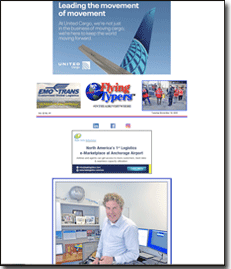 Vol.
22 No. 41 Vol.
22 No. 41What Makes Jan Krems Run? Chuckles for November 14, 2023 Kale Takes IST On New Cargo Airline For India |
|
Publisher-Geoffrey Arend
• Managing Editor-Flossie Arend • Editor Emeritus-Richard
Malkin Film Editor-Ralph Arend • Special Assignments-Sabiha Arend, Emily Arend |
Send comments and news to geoffrey@aircargonews.com
|